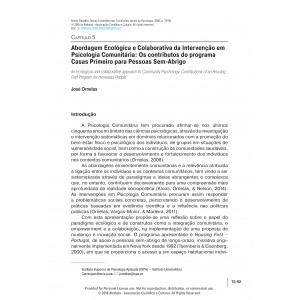Bret, K., & Shah, S. (2009). A social ecological approach to investigating relationships between housing and adaptive functioning for persons with serious mental illness American Journal of Community Psychology, 44 (3-4), 316-326.
Busch, G. (2013). Bremen/Brussels: Housing First Europe, socialstyrelsen.dk Executive Summary The Housing First Europe (HFE) project was a social experimentation project, funded by the European Commission, DG for Employment, Social Affairs and Inclusion, under the PROGRESS programme from August 2011 to July 2013.
Dalton, J. H., Elias, M. J., & Wandersman, A. H. (2001). Community Psychology: Linking Individuals and Communities. Stamford: Wadsworth Publishing.
Espino, S.R., & Trickett, E.J. (2008). The spirit of ecological inquiry and intervention research: A heuristic elaboration. American Journal of Community Psychology, 42, 60-78
Greenwood, R. M., Schaefer-McDaniel, N., Winkel, G., & Tsemberis, S. (2005). Decreasing Psychiatric Symptoms by Increasing Choice in Services for Adults with Histories of Homelessness. American Journal of Community Psychology, 36(3/4), 223-238.
Gulcur, L., Tsemberis, S., Stefanic, A., & Greenwood, R. (2007). Community integration of adults with psychiatric disabilities and histories of homelessness. Community Mental Health Journal, 43(3), 211-228.
Jorge-Monteiro, M. F., Aguiar, R., Sacchetto, B., Vargas-Moniz, M.J., & Ornelas, J. H. (2014). “What transformation? A qualitative study on empowering settings and community mental health organizations”. Global Journal of Community Psychology Practice, 5 (1), 1 - 13.
Kelly, J. G. (2003). Science and Community Psychology: Social norms for pluralistic inquiries. American Journal of Community Psychology, 31(3/4), 213-217.
Kelly, J. G. (2006). Becoming Ecological: An Expedition into Community Psychology. New York: Oxford University Press.
Kloos, B., Ornelas, J. H., & Nelson, G. (2014) Community Psychology History and Theory as Resources for Transformative Change in Mental Health. In G. Nelson, B. Kloos & J. Ornelas (Eds.), Community Psychology and Community Mental Health: Towards Transformative Change (pp. 23 – 50). New York: Oxford University Press.
Levine, M., Perkins, D. D., & Perkins, D. V. (2005). Principles of community psychology: Perspectives and applications (3rd ed.). New York: Oxford University Press.
Lysaker, P.H., Roe, D., & Yanos, P.T. (2007). Toward understanding the insight paradox: Internalized stigma moderates the association between insight and social functioning, hope, and self-esteem among people with schizophrenia spectrum disorders. Schizophrenia Bulletin, 33 (1), 192–199.
Nelson, G., Sylvestre, J., Aubry, T., George, L., & Trainor J. (2007). Housing choice and control, housing quality, and control over professional support as contributors to the subjective quality of life and community adaptation of people with severe mental illness. Administration Policy Mental Health, 34 (2), 89-100.
Nelson, G. (2010). Housing for people with serious mental illness: Approach evidence and transformative change. Journal of Sociology and Social Welfare, 37, 123-146.
Nelson, G., Clarke, J., Febbraro, A., & Hatzipantelis, M. (2005). A narrative approach to the evaluation of supportive housing: Stories of homeless people who have experienced serious mental illness. Psychiatric Rehabilitation Journal, 29 (2), 98-104.
Ornelas, J. (2008). Psicologia Comunitária. Lisboa: Fim de Século.
Ornelas, J., Martins, P., Zilhão, M.T., & Duarte, T. (2014). Housing First: An ecological approach to promoting community integration. European Journal of Homelessness, 8 (1), 29 - 56.
Ornelas, J., Vargas-Moniz, M., & Duarte, T. (2010). Community Psychology and social change: A story from the field of mental health in Portugal. Global Journal of Community Psychology Practice,1 (1), 21-31.
Ornelas, J., & Vargas-Moniz, M. J. (2011). Parcerias Comunitárias. Lisboa: ISPA Edições.
Ornelas, J., Vargas-Moniz, M. J., & Madeira, T.M. (2011). Contribuciones de la Psicología Comunitaria a las políticas sociales en las áreas de la integración psicosocial y en la violencia contra las mujeres. In A. Sánchez-Vidal, J. Alfaro & A. Zambrano (Comps.), Psicología Comunitaria y Políticas Sociales: Reflexiones y Experiencias (pp. 255 – 288). Buenos Aires: Ediciones Paidós.
Hall, G.B., & Nelson, G. (1996). Social networks, social support, personal empowerment, and the adaptation of psychiatric consumers/survivors: Path analytic models. Social Science & Medicine, 43(12), 1743-1754.
Parkinson, S., Nelson, G., & Horgan, S. (1999). From housing to homes: A review of the literature on housing approaches for psychiatric consumer/survivors. Canadian Journal of Community Mental Health, 18(1), 145-164.
Rappaport, J. (1984). Studies in empowerment: Steps towards understanding and action. In J. Rappaport (Ed.), Prevention in Human Services (Vol. 3, 37-72). New York: The Haworth Press.
Rudkin, J. K. (2003). Community psychology: guiding principles and orienting concepts. Upper Saddle River, NJ: Prentice Hall.
Srebnik, D., Livingston, J., Gordon, L., & King, D. (1995). Housing choice and community success for individuals with serious and persistent mental illness. Community Mental Health Journal, 31 (2), 139-152.
Tsemberis, S., & Eisenberg, R. (2000). Pathways to Housing: Supported Housing for Street-Dwelling Homeless Individuals with Psychiatric Disabilities. Psychiatric Services, 51(4), 487-493.
Tsemberis, S., Gulcur, L., & Nakae, M. (2004). Housing First, consumer choice, and harm reduction for homeless individuals with dual diagnosis. American Journal of Public Health, 94(4), 651-656.
Tsemberis, S., Kent, D., & Respress, C. (2012). Housing stability and recovery among chronically homeless persons with co-occurring disorders in Washington, DC. American Journal of Public Health, 102(1), 13-16.
Wong, Y.-L. I., & Solomon, P. L. (2002). Community integration of persons with psychiatric disabilities in supportive independent housing: A conceptual model and methodological considerations. Mental Health Services Research, 4, 13-27.
Wright, P.A., & Kloos, B. (2007). Housing environment and mental health outcomes: A levels of analysis perspective. Journal of Environmental Psychology, 27(1), 79–89.
Zimmerman, M. A. (2000). Empowerment theory: Psychological, organizational and community levels of analysis. In J. Rappaport, & E. Seidman (Eds.), Handbook of Community Psychology (pp. 43-64), New York: Kluwer Academic/ Plenum.









